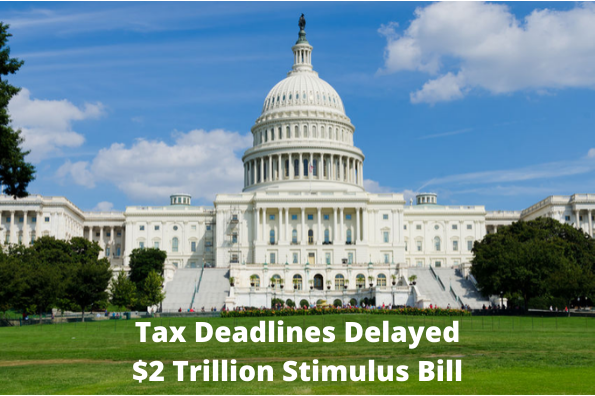
It’s difficult to overstate the impact the global pandemic is having on all of us.
Today, I focus on how recent changes to tax due dates and the stimulus bill might affect you.
The due date to file and pay your Federal income taxes has been extended to July 15, 2020.
Most but not all states have followed suit.
Just this morning 3/27/20 Massachusetts announced they would also extend the deadline.
Also extended to July 15, 2020:
- Q1 estimated tax payments for 2020
- Deadline for 2019 IRA contributions.

If you have already filed your 2019 tax return and scheduled payment of tax due via direct debit in April, you can cancel the direct debit and send the payment in July.
To cancel your direct debit payment, Call 1-888-353-4537
You must wait 7-10 days after your return was accepted to call.
Cancelation request must be received two business days before the scheduled payment date.
They will ask for:
- SS#
- Individual or business return
- Scheduled date of direct debit
- Amount
- Routing and Account number of the bank account
I did this myself; it was painless and did not take long.
Now on to the $2 Trillion stimulus bill.
The bill weighs in at a whopping 883 pages, so obviously I’m not going to cover everything. I will focus here on measures for individuals. The bill also includes much for businesses.
The bill has been passed by the Senate and is expected to pass the House today, 3/27/20.
Shout out to Jeff Levine @CPAPlanner for summarizing the salient points.
Stimulus checks
$1200 to individuals and $2400 to joint filers with an additional $500 for each dependent age 16 or under.
The amount is phased out for high-income taxpayers.
The phaseout is based on your 2018 Adjusted Gross Income (AGI) or your 2019 AGI if you’ve filed your 2019 return.
You can find your AGI on Line 8b of your 2019 1040 Form or on Line 7 of your 2018 1040 Form.
- For Joint Filers the stimulus check amount is phased out starting at AGI of $150,000 and completely phased out at $198,000.
- For Head of Household filers $112,500 and $136,500.
- For everyone else $75,000 and $99,000.
The payments will be issued via direct deposit to the bank account that was authorized for your 2018 or 2019 refund/payment. If they don’t have direct deposit info they will snail mail a paper check.
RMDs for 2020 waived
If you must take a Required Minimum Distribution (RMD) in 2020 this will be waived.
This RMD waiver applies to IRAs and employer retirement plans.
If you have already taken your RMD for 2020, there is no mechanism to put it back.
Exceptions to the 10% early distribution penalty for certain individuals impacted by the pandemic (this is very broadly defined)
You can take an early distribution (before age 59 ½) from an IRA or employer plan, up to 100K in 2020 and not pay a 10% penalty.
The income tax is spread out over 3 tax years (unless you elect to include it all in 2020)
You also have the option to repay the distribution within three years
and avoid paying the tax. In this case you can amend prior year returns
to get a refund.
There is a $300 above-the-line charitable contribution deduction for 2020
In plain English this means you can get a tax break for giving to
charity even if you do not itemize your deductions. Under Tax Reform
many taxpayers no longer itemize.
Student loan relief
Loan payments for Federal loans are suspended through 9/30/2020 and during this time no interest will accrue.
These are some of the main points for individuals.
The bill also gives additional unemployment to those unemployed for greater than 4 months.
